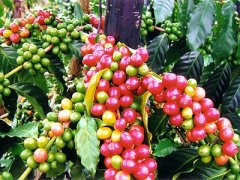Kenyan specialty coffee Introduction Kenyan coffee Market Kenyan coffee Features Kenya
In 1878, the British landed coffee in Africa and set up a coffee plantation in Kenya in the 19th century, when Ethiopian coffee drinks were imported to Kenya through southern Yemen. But it was not until the early 20 th century that the Bourbon Coffee Tree was saint. The Austin Mission (St.AustinMission) was introduced.

Coffee producing areas in Kenya:
Coffee from Kenya (Kenya) is mostly grown at an altitude of 1500 Murray 2100 meters and is harvested twice a year. Kenyan coffee is grown by small farmers. Kenyan coffee is produced near the Kenyan Mountains in central Kenya and is sometimes guaranteed in the name of the capital, Nairobi. Kenya AA (Kenya AA) is produced on the 17000-foot hillside of Mount Kenya near Nairobi, the capital of Kenya. Kenya AA is the largest coffee bean in the country, followed by An and B again. Its unique bitterness and wine taste are most praised by people. Located in Kenya below the equator of East Africa, the coffee beans planted are high-quality Arabica seeds. The size of the beans is medium-large, very thick and delicious, and the acidity is moderate.
The characteristics of Kenyan coffee:
People in the coffee industry regard Kenyan coffee as one of its favorite products, with wonderful and satisfying aromas, balanced acidity, well-proportioned granules and excellent fruit flavors.
Kenyan coffee grades are divided into seven grades according to the size of coffee beans and six grades according to taste. The best coffee in Kenya is bean berry coffee (PB), followed by AA++, AA+, AA, AB and so on. The fine coffee is shiny, delicious and slightly alcoholic. "Kenya AA" is particularly well received in terms of taste.
Kenyan coffee has a slightly sour, thick aroma, raw bean particles are small, green to grayish green. Kenya's coffee beans are washed Arabica species, famous for (Kenya Arabica), especially in the United Kingdom, Kenyan coffee surpassed Costa Rican coffee to become one of the most popular coffee.
Flavor: aromatic, full-bodied, with fruit flavor, rich and perfect taste
Suggested baking method: medium baking, the best deep baking
★★★: excellent
The Kenyan coffee market:
The Kenyan government takes the coffee industry very seriously, where it is illegal to cut down or destroy coffee trees. Kenyan coffee buyers are world-class high-quality coffee buyers, and no other country can grow, produce and sell coffee on a continuous basis like Kenya. All coffee beans are first acquired by the Kenya Coffee Commission (CoffeeBoardofKenya, CBK), where they are identified, graded, and then sold at weekly auctions, where they are no longer graded. The Kenya Coffee Commission only acts as an agent to collect coffee samples and distribute them to buyers so that they can determine the price and quality. The auction in Nairobi is for private exporters, and the Kenya Coffee Commission pays growers a price below the market price.
After harvesting the coffee, the Kenyan coffee plantation first sends the fresh coffee beans to the cooperative cleaning station, where the washed and dried coffee is sent to the cooperative in the form of "parchment coffee beans" (that is, coffee beans covered with endocarp) ("parchment coffee beans" is the last state of coffee beans before peeling). All the coffee is collected together, and the growers charge the average price according to their actual quality. This trading method generally works well and is fair to both growers and consumers.
Auctions are also organized to meet the needs of dispatchers. This kind of auction usually has a small auction volume (3-6 tons each), with samples with the grower's logo for buyers to enjoy. After the auction, the exporters pack according to different flavors, different qualities and the quantity required by the blenders. This provides a great deal of flexibility for the dispatcher. Quality-conscious Germans and Scandinavians are long-term buyers of Kenyan coffee. Some buyers, especially Japanese businessmen, have expressed dissatisfaction with the Kenyan coffee industry system. But in any case, Kenya's detailed rules and regulations and sound procedures are a model for all coffee-producing countries.
Important Notice :
前街咖啡 FrontStreet Coffee has moved to new addredd:
FrontStreet Coffee Address: 315,Donghua East Road,GuangZhou
Tel:020 38364473
- Prev

The characteristics and Market of Indonesian Coffee Indonesian boutique coffee Indonesian coffee taste
In the mid-17th century, coffee trees were introduced to Indonesia by the Dutch (some official sources believe that earlier). The first batch of coffee from Java was sold to Amsterdam in 1712. However, coffee trees in all plantations were destroyed by coffee rust in 1877, and Robart coffee trees had to be introduced from Africa to replace the original species. Today, only 6% of the coffee beans and 10% of the coffee beans are Arab.
- Next

Jamaican Blue Mountain boutique coffee Blue Mountain Coffee introduction to Blue Mountain Coffee
Almost everyone in Jamaica knows that Blue Mountain Coffee is the most expensive coffee in the world. In 1725, Sir SirNicholasLawes brought the first Blue Mountain Coffee species from Martinique to Jamaica and planted them in the St.Andrew area. Coffee producing area of Jamaica: today's St. Andrews is still Blue Mountain Coffee.
Related
- Detailed explanation of Jadeite planting Land in Panamanian Jadeite Manor introduction to the grading system of Jadeite competitive bidding, Red bid, Green bid and Rose Summer
- Story of Coffee planting in Brenka region of Costa Rica Stonehenge Manor anaerobic heavy honey treatment of flavor mouth
- What's on the barrel of Blue Mountain Coffee beans?
- Can American coffee also pull flowers? How to use hot American style to pull out a good-looking pattern?
- Can you make a cold extract with coffee beans? What is the right proportion for cold-extracted coffee formula?
- Indonesian PWN Gold Mandrine Coffee Origin Features Flavor How to Chong? Mandolin coffee is American.
- A brief introduction to the flavor characteristics of Brazilian yellow bourbon coffee beans
- What is the effect of different water quality on the flavor of cold-extracted coffee? What kind of water is best for brewing coffee?
- Why do you think of Rose Summer whenever you mention Panamanian coffee?
- Introduction to the characteristics of authentic blue mountain coffee bean producing areas? What is the CIB Coffee Authority in Jamaica?

